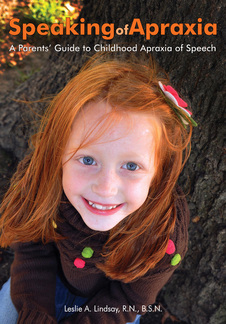 Special Thanks to Leslie Lindsay, R.N. B.S.N. for her guest post on Futureslps.com regarding Childhood Apraxia of Speech (CAS). Follow her Tweets on Twitter and Like her Facebook Page. _______________________________________________ You won’t soon forget her. The red hair and blue eyes the size of saucers will linger in your memory. So, too will the fact that she is as fire-y and energetic as that copper hair that cascades down her back, framing her freckled face with possibility. And when you hear her speak, you may have an inkling that she once suffered from moderate to severe childhood apraxia of speech (CAS), or you may be none the wiser. Although Kate is a bright, creative, and eager soon-to-be 2nd grader, she has overcome a road block most of us never have to deal with: a struggle to communicate expressively. And why do I share this? Since you are about to embark into an exciting profession of working with children and their families, I’d like you to have an inside view of what it’s like to raise a child with CAS. · We are hurting. We feel a sense of loss in our child’s lack of verbal communication. We are grieving. We didn’t want this to happen. Heck, most of us don’t even know what CAS is! · We are frustrated. We don’t know what we are doing wrong (some of us blame ourselves on our child’s inability to speak). It’s hard to live a life where we only hear our child(ren) point and grunt to get their needs met. · We feel all alone. It’s not every day you run into someone else who is also struggling with CAS. It often feels like it is “us” against “the world.” If you know of anyone else who is open to connecting for play dates or support groups, hook us up! · We have a lot of other concerns. It may be that we have to take off work early—or stop working altogether to make sure our child gets to speech therapy. Money may be tight. Our insurance may be giving us a hard time. The demands of raising a family, running a household, and dealing with apraxia may have taken a toll on our relationships. · We have a full, busy life. Apraxia and speech therapy is a part of our life, but we are many things to many people. Please respect our time. · Deep down, we just want to have a “normal” kid. When we overhear a precocious 3-year old chatting with his mommy or daddy at the local park or coffee shop, our heart breaks. “Why can’t that be my kid?!” · We worry. Will this ever get better? Will my child be able to talk—when? What do I need to do? · We want to help. Let us into your speech-pathology world. You don’t have to give away all of the secrets to the trade, but let us be your partner. As a professional SLP, here’s what you can do to help smooth our path: · Give us homework, tips, ideas, and more information on childhood apraxia. Some folks may request this, others might not know what they need or want. Feel us out. If you come across something in your professional life you think will help, but all means, pass it on. ·Treat us with respect and compassion. We know a lot about our children and we want to help them. · But don’t tip-toe around our feelings. Go ahead, lay it on me. Tell me that CAS is serious and complex and can take years to remediate. Tell me, too that you will do all you can to help my child learn to speak verbally and that we are in this together. I need that right now. · Ask us about our home life. We may have some inside tips to help you with our child in therapy. For example, she really does get scared of bubbles; please do not blow them with her. She can’t go anywhere without her favorite stuffed puppy. Let her bring him to therapy and perhaps incorporate him into your activities. You see, as a former R.N. who worked with children day and night in an inpatient child psychiatry program at the Mayo Clinic, I know that children and their families matter. We are not simply a diagnosis who needs treatment. We are real people, with real feelings and real lives. It is because of my daughter Kate that I wrote the first book designed for parents on this complex neurologically-based motor speech disorder. SPEAKING OF APRAXIA: A PARENT’S GUIDE TO CHILDHOOD APRAXIA OF SPEECH (Woodbine House, 2012) is as much as labor of love as it is a resource to help others along their apraxia journey. The book is comprised of over 300 pages of tips, ideas, research, and more on various topics related—not just to CAS—but other speech disorders from suspecting a problem to getting treatment (what that treatment consists of), school challenges, what you can do at home, family coping, child coping, networking, advocating, and co-morbid conditions. Sprinkled throughout are quotes from parents speaking out about apraxia—what helped, what mattered, and what challenged them. Speaking of Apraxia is a must-have for every practicing pediatric SLP. Read what others are saying: " I was so excited to open up my Advance for SLPs magazine today and see your book advertised! Your ‘baby’ is out there. I wish you lots and lots of success with it!" --R.W. An SLP in Missouri shares this: "I already have a couple of families in mind that I am excited to tell about Speaking of Apraxia. What a great resource!" "I could feel your blood, sweat and tears as I flipped through the pages (wiping my eyes).Outstanding! I just shook my head in amazement...I am in awe and I am still kind of speechless...really! This book will be just one of your legacies...well done!!" --T.K.P., CCC-SLP in Minnesota And remember, our kids need your special touch. For without the “magic” of dedicated SLPs, our children with apraxia wouldn’t be able to make the gains they do. Thank you.  Bio: Leslie Lindsay is former child/adolescent psych R.N. at the Mayo Clinic-Rochester. She is the mother of two school-aged daughters and a basset hound, named Sally. Lindsay and her family reside in the Chicago suburbs where she writes full-time. She is the author of “Speaking of Apraxia: A Parents’ Guide to Childhood Apraxia of Speech” (Woodbine House, March 2012). Read more on her blog, “Practical Parenting…with a Twist” where she writes about apraxia, parenting, education, and more 5 days a week, www.leslie4kids.wordpress.com.
1 Comment
Future SLPs is honored to have our first guest blogger, Jena H. Casbon, MS CCC-SLP.
I hope you enjoy reading this post as much as I did! Private Patients: A Great Opportunity for SLP's Experiences During School Will Prepare You For... It never ceases to amaze me how rich and diverse the field of Speech-Language Pathology is. Many incoming and early graduate students tend to think of our field in terms of:
Your Clinical Fellowship and Early Career The 9-month clinical fellowship (CF) that will follow graduation is a both stressful and liberating time in your career. In many ways, you are on your own now: able to work on the areas where you feel your patient needs the most help. This degree of autonomy can be scary for many CF's but hopefully your supervisor, colleagues or former graduate school classmates can support and encourage your clinical decision making. During the first few years of your career as a Speech-Language Pathologist you will continue to learn so much about disorders, how patients can present differently, how to manage patients and family dynamics, etc. At this stage you will likely begin to gravitate to a specific age group, diagnosis, etc. I urge you to take as many continuing education courses (CEU's) as you can as you build your expertise. You may even opt to change jobs or settings in order to gain more exposure to different aspects of our field. All of these things will help you to grow and provide excellent care for your patients. I Wonder If I Could Ever Have A Private Practice...? Almost every SLP friend of mine started out dreaming one day of having a private practice- but as they got into the field more and more, the safety of a regular job with consistent pay won out over the risk of going out on their own. To be honest, starting a private practice has a lot of extra work, extra responsibilities and headaches- but the trade off of high-income and more autonomy is very alluring for some people. Private Patients: A Great Way to Start Most of us got into this field because we love to help people, not because we wanted to make money. As time goes by though, the reality of car or house payments, wanting to have extra income for our families, vacations, etc. starts to hit and we become frustrated with our regular pay. Another benefit to private patients is flexibility of your schedule and also getting to treat ideal patients. Treating privately is a great way to help more people while making more money by seeing one to several private patients on the side. How Does Private Therapy Work? At some point, you will know colleagues that are treating private patients and a patient or family member will ask if you can provide private treatment. Private speech therapy is often requested as a way to deal with:
Is Private Therapy Right For You? I recommend that you have at least 2-3 years experience as an SLP before you begin treating privately. You need to build up your expertise in a diagnosis or treatment technique so that your services are truly valuable to your private patients. Because you'll be doing this on your own, you need to develop a level of confidence about both your clinical and business skills before you start. Starting to see private patients is almost like your CF all over again. Once you have some practice and experience, you'll feel much stronger. Some clinicians start with private patients and then graduate to starting their own free-standing private practice- others keep their regular job and see private patients on the side. I hope this has helped open your mind to yet another really cool aspect of the field of Speech-Language Pathology! ________________________________________________________________________________________________ Jena H. Casbon, MS CCC-SLP is a Speech-Language Pathologist and founder of The Independent Clinician. After graduating from Emerson College in 2005, she has worked with adult outpatients in a rehabilitation hospital and inpatients in a skilled nursing facility. Three years into practicing as an SLP, she began treating private patients- but the lack of a "how-to guide" bothered her, so she wrote one. Follow Jena on Twitter @IndClinician and Facebook http://www.facebook.com/independentclinician Be sure to visit http://www.IndependentClinician.com to learn more about how to treat private patients. |
Categories
All
Archives
November 2021
|
 This work is licensed under a Creative Commons Attribution-NonCommercial-NoDerivs 3.0 Unported License. |
© Copyright 2010-2020 futureslps.com All Rights Reserved Worldwide